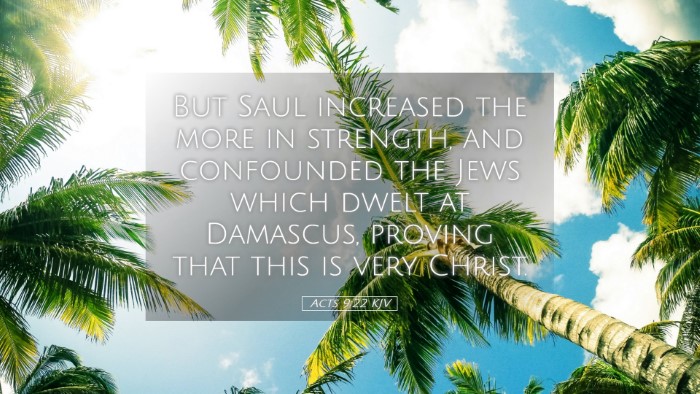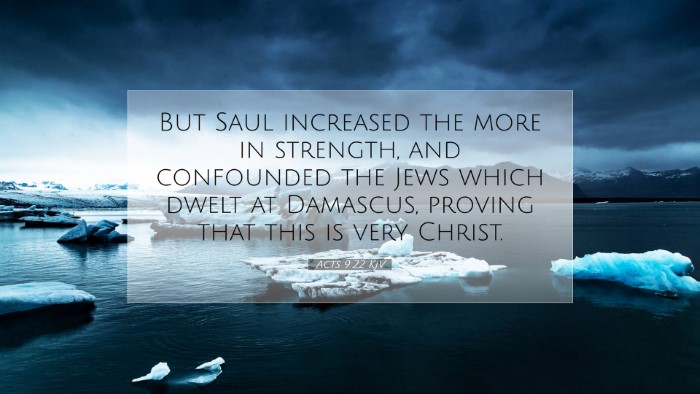Commentary on Acts 9:22
Verse Context: Acts 9:22 recounts a pivotal moment in the life of Saul of Tarsus, later known as the Apostle Paul, where it is noted that he became more powerful in his new faith and confounded the Jews in Damascus. This verse serves as a significant point in the narrative of Saul's conversion and subsequent ministry.
Historical Background
Before delving into verse 22, it is essential to understand the historical and theological backdrop of Acts. The book of Acts, written by Luke, details the early church's formation and spread of the gospel following the ascension of Christ. Saul, a Pharisee, was zealous in his persecution of Christians, but his conversion marked a turning point in the mission of the church.
Verse Analysis
Acts 9:22 states: "But Saul increased all the more in strength, and confounded the Jews who dwelt in Damascus, proving that this Jesus is the Christ." This statement can be broken down into several key components:
- Increased in Strength: This phrase signifies not merely a physical strength but a spiritual and intellectual ability that comes from his transformative experience with Jesus. Matthew Henry notes that Saul's increased strength refers to the augmented fervor and zeal he exhibits in preaching and defending the truth.
- Confounded the Jews: Saul’s profound understanding of the Scriptures enabled him to confound his adversaries. He used his knowledge of the Law and Prophets to portray Jesus as the fulfillment of messianic prophecies. Albert Barnes emphasizes that Saul's arguments overwhelmed his opponents intellectually, showcasing both the power of the Holy Spirit in him and the truth of his message.
- Proving that Jesus is the Christ: This statement encapsulates Saul's mission. Adam Clarke highlights that proving the Christship of Jesus involves demonstrating through evidence and reasoning that Jesus fulfills all the prophecies and expectations of the Messiah found in the Jewish Scriptures.
Theological Insights
The theological implications of Acts 9:22 resonate deeply within Christian doctrine. This verse illustrates the transformative power of faith and the role of the believer as an agent of theological challenge and proclamation. Henry points out that the transformation of Saul from a persecutor to a defender of the faith is a prime example of God's redeeming grace.
Moreover, the verse reinforces the premise that true understanding of Christ often entails a radical shift in belief for those who encounter Him. Scholarly interpretations indicate that Saul's experience serves as a model for the believer's journey—where advancing in strength consistently involves engaging with Scripture and the Holy Spirit's guidance.
Practical Applications
For pastors and theologians, Acts 9:22 can be a potent reminder of the importance of grounding sermons and teachings in the Word as it relates to Christ. Here are several practical applications:
- Encouragement for the Faithful: Just as Saul increased in strength, believers today can take heart that spiritual growth is possible. This verse encourages continuous study and reliance on Scripture to deepen one's faith and understanding.
- Engaging with Doubters: Like Saul, Christians are called to confound those who are skeptical. Engaging with others through sound reasoning and evidence of faith can be an effective means of witnessing.
- Witnessing Transformation: Saul's transformation is crucial for indicating the change that can happen through Christ. Pastors can emphasize the role of personal testimony in evangelism, encouraging congregants to share their stories of transformation.
Conclusion
Acts 9:22 stands as a powerful testament to the transformative nature of an encounter with Jesus Christ. It encapsulates the journey from opposition to advocacy, inviting both the ancient and contemporary reader to reflect on the implications of faith. The insights from various public domain commentaries underscore the depth of this passage, reinforcing its relevance for today's church. As believers, understanding this transformation compels us to be emboldened in our own faith journeys, extending outwards with intellect, conviction, and the love of Christ.


